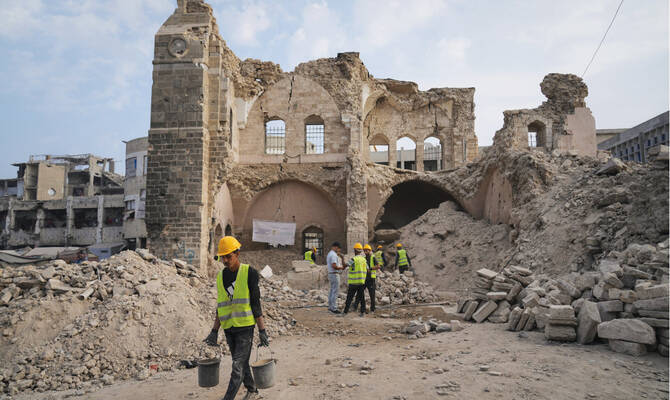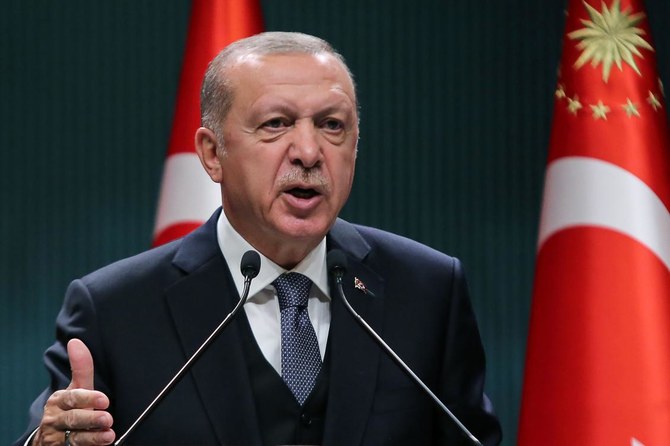ANKARA: The Turkish government is set to establish a parliamentary commission to further regulate the usage of social media platforms.
The launching of the “Digital Mediums Commission” coincides with the plans of the ruling Justice and Development Party (AKP) to adopt legislation to increase the government’s control over free expression on social media.
The idea has been under discussion for a while, but after President Recep Tayyip Erdogan’s daughter Esra Albayrak was insulted on Twitter the government pressed ahead with designing a new legal framework to “abolish these platforms completely or to put them under control”, said Erdogan, who thinks social media platforms that enjoy total freedoms do not suit the nation.
These remarks came some days prior to a live appearance of Erdogan on June 26 on YouTube to give a speech to youth, but his feed was overloaded with hundreds of thousands of dislikes and negative comments from young people saying “No Vote For You Again.”
The draft legislation requires the appointment of Turkey representatives for social media providers, especially Twitter and Netflix to respond to legal requests.
The regulation would allow the government to implement access bans and impose legal and fiscal penalties.
The draft regulation with nine articles is expected to be adopted before parliament goes on vacation on July 24.
Suleyman Irvan, a professor of journalism from Uskudar University, said any restriction on social media may trigger anger from members of Generation Z.
“Obliging social media providers to open an office in Turkey aims at implementing the court rulings about social media content, especially those related to the removal of content, and bringing huge amounts of fees that would discourage any anti-government contents in the future,” he told Arab News.
The main opposition CHP thinks that the move primarily aims at curtailing people’s freedoms. Kemal Kilicdaroglu, main opposition leader, criticized the legislation, claiming that it is because Erdogan received negative feedback from the online audience during his live speech.
“He understands what is going to come from Generation Z. Otherwise, why would this subject come to the fore now? We will defend the areas of freedom against this repressive mindset,” he recently said.
Ankara criticized Twitter last month for suspending more than 7,000 government-linked accounts associated with the AKP’s youth wing, saying it was part of a wider plan to smear the government and to intervene in domestic Turkish politics.
Twitter’s official figures show that 74 percent of the legal requests to remove Twitter content originated from Turkey. The latest “Blocked Web” annual report by Freedom of Expression Association said that access to a total of 408,394 websites was blocked from 2014 to the end of 2019.
Last year, access to 130,000 URL addresses, 7,000 Twitter accounts, 10,000 YouTube videos and 6,251 Facebook posts were blocked by the government. It also banned Twitter in 2014, though the ban was lifted within few weeks through a court ruling in the country which is a global leader in Twitter usage.
Erkan Saka, an expert in social media from Istanbul Bilgi University, does not expect fair recommendations from the commission as the majority of parliamentary commissions are controlled by the members of the ruling party.
“The social media faces less control compared to the mainstream media and the government is keen to change this. This is a new step in legalizing restrictive measures that have intensified since the coup attempt in 2016,” he said.
Turkey moves toward social media restrictions
https://arab.news/9hcds
Turkey moves toward social media restrictions

- The draft legislation requires the appointment of Turkey representatives for social media providers
- The regulation would allow the government to implement access bans and impose legal and fiscal penalties
Fledgling radio station aims to be ‘voice of the people’ in Gaza

- The electricity crisis is one of the most serious and difficult problems in the Gaza Strip, says Shereen Khalifa Broadcaster
DEIR EL-BALAH: From a small studio in the central city of Deir El-Balah, Sylvia Hassan’s voice echoes across the Gaza Strip, broadcast on one of the Palestinian territory’s first radio stations to hit the airwaves after two years of war.
Hassan, a radio host on fledgling station “Here Gaza,” delivers her broadcast from a well-lit room, as members of the technical team check levels and mix backing tracks on a sound deck. “This radio station was a dream we worked to achieve for many long months and sometimes without sleep,” Hassan said.
“It was a challenge for us, and a story of resilience.”
Hassan said the station would focus on social issues and the humanitarian situation in Gaza, which remains grave in the territory despite a US-brokered ceasefire between Israel and Hamas since October.
“The radio station’s goal is to be the voice of the people in the Gaza Strip and to express their problems and suffering, especially after the war,” said Shereen Khalifa, part of the broadcasting team.
“There are many issues that people need to voice.” Most of Gaza’s population of more than 2 million people were displaced at least once during the gruelling war.
Many still live in tents with little or no sanitation.
The war also decimated Gaza’s telecommunications and electricity infrastructure, compounding the challenges in reviving the territory’s local media landscape. “The electricity problem is one of the most serious and difficult problems in the Gaza Strip,” said Khalifa.
“We have solar power, but sometimes it doesn’t work well, so we have to rely on an external generator,” she added.
The station’s launch is funded by the EU and overseen by Filastiniyat, an organization that supports Palestinian women journalists, and the media center at the An-Najah National University in Nablus, in the occupied West Bank.
The station plans to broadcast for two hours per day from Gaza and for longer from Nablus. It is available on FM and online.
Khalifa said that stable internet access had been one of the biggest obstacles in setting up the station, but that it was now broadcasting uninterrupted audio.
The Gaza Strip, a tiny territory surrounded by Israel, Egypt, and the Mediterranean Sea, has been under Israeli blockade even before the attack on Oct. 7, 2023, which sparked the war. Despite the ceasefire, Israel continues to strictly control the entry of all goods and people to the territory.
“Under the siege, it is natural that modern equipment necessary for radio broadcasting cannot enter, so we have made the most of what is available,” she said.














